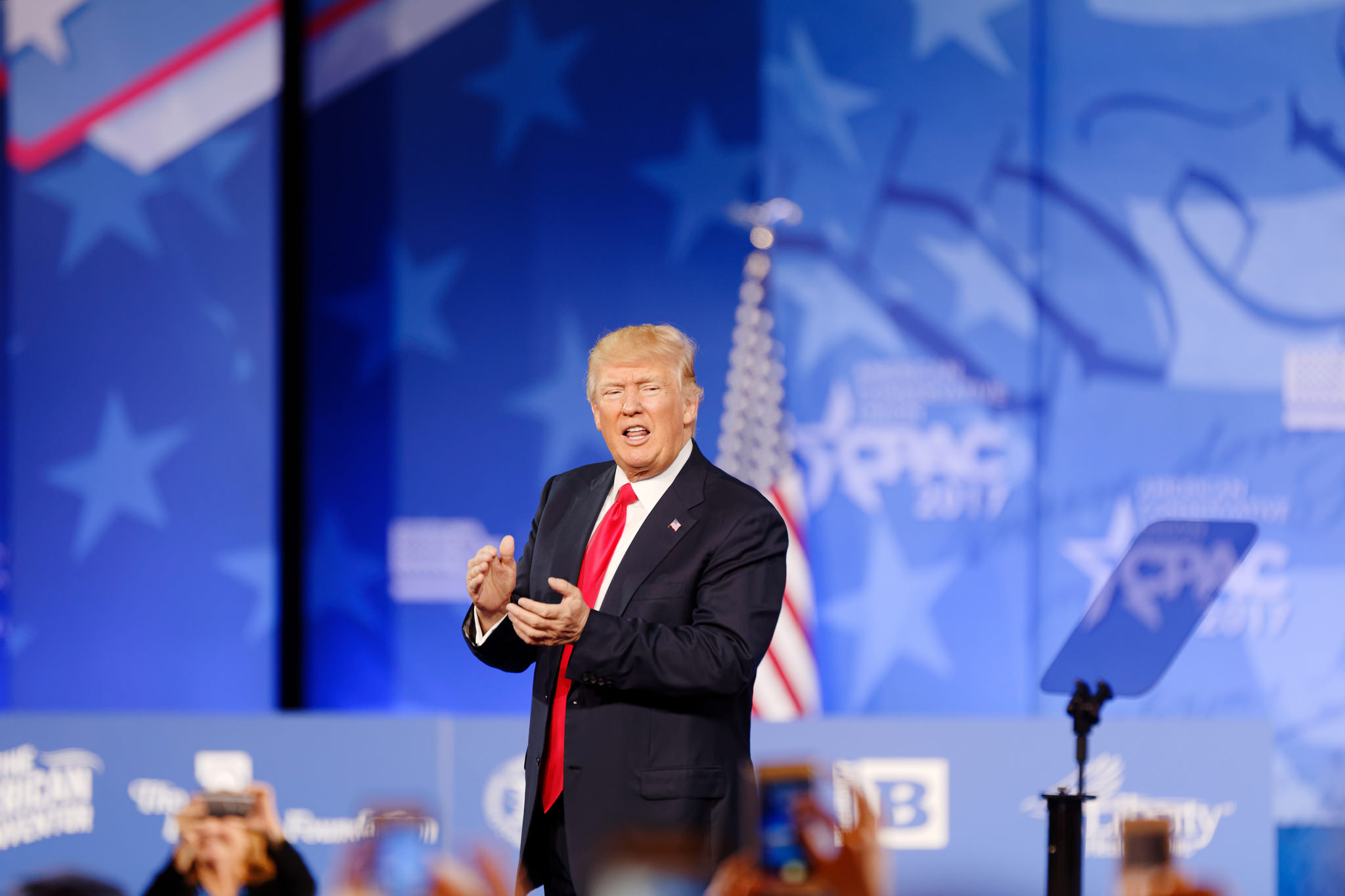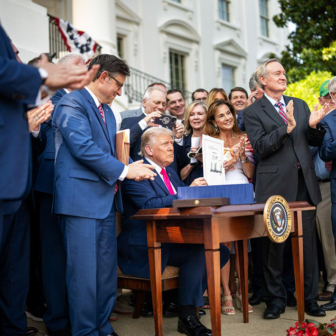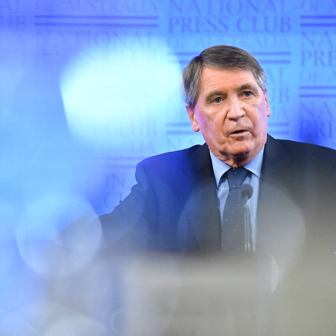Most security experts fear that Donald Trump doesn't have the temperament for the presidency. They also believe that many of his policy ideas pose enormous dangers not just to the United States but in trouble spots across the world. But disentangling those two concerns – the man and the program – isn't straightforward, because the new president's rhetoric so often seems to reflect those underlying character flaws.
The signs of trouble were on display during the election campaign. Among Trump's security themes, three were particularly prominent: a promise to destroy radical Islamic terrorism, especially Islamic State, within months if not weeks; a commitment to greatly increase US military strength; and a pledge to put “America First.” He also criticised America’s overseas allies, advocated better relations with Russia, and called for a tough line on China and Iran. In each case, he brashly advocated a break from past practice.
One thing that worked in favour of Trump the iconoclastic candidate was the failure of US strategic thinking following the declaration of a war on terror after 11 September 2001. The weapons of mass destruction fiasco; the invasion of Iraq and the chaos that followed; and dropping the strategic ball in Afghanistan – these have cost trillions of dollars, tens of thousands of lives and an incalculable amount of American credibility. Meanwhile, China’s resurgence continued, Iran’s role in the Middle East grew, and Russia became aggressively self-confident. Civil war continued in Iraq and Afghanistan despite the moral and legal obligation on the invading powers – America, Britain and Australia – to ensure a basic level of post-war order.
A new approach seemed to be in order. Perhaps the new president could bring something valuable to the table, as he promised?
Typically, Trump had claimed back in 2015 to know more about Islamic State than American generals. He had a “foolproof” plan to bring about “total victory” over ISIS “very, very quickly.” Later, he said:
There is a way of beating ISIS so easily, so quickly and so effectively and it would be so nice… I know a way that would absolutely give us absolute victory…
[It’s] so simple. It’s like the paper clip. You know, somebody came up with the idea of the paper clip and made a lot of money and everybody’s saying, “Boy, why didn’t I think of that, it’s so simple.” This is so simple, so surgical, it would be an unbelievable thing.
Trump said his plan had to be kept secret to avoid tipping-off the enemy. But there’s no evidence he had any special insight into ISIS or the best way to deal with it. Time will tell if the commander-in-chief really has a heavily camouflaged magic bullet, but he’s already passed his implied deadline to destroy the organisation. ISIS has indeed been squeezed hard on the battlefield, but this reflects strategies adopted before Trump’s election. In any case, the difficulties ahead are considerable.
Thwarting potential terrorists is an ostensible aim of Trump’s immigration policy. Critics see his position here as essentially racist and encouraging the inflammatory and counterproductive idea of a war against Islam. Add to this his earlier comments suggesting families of terrorists ought to be killed, and the claim that torture works (and should be “a hell of a lot worse than waterboarding”), and it’s easy to understand why US officials might be alarmed about how relations with the Islamic world could unfold.
America’s fight against ISIS hasn’t been hampered by lack of money. Despite Trump’s claim that US forces are dangerously depleted, the defence budget is running at a relatively high level in historical terms. In any case, aside from a small fraction of the air force, the military component of the war on terror mostly involves special forces rather than the big-ticket items that dominate the Pentagon’s budget. Even so, Trump has called for an extra US$54 billion per year (an almost 10 per cent increase), despite the fact that the United States continues to spend more than double the combined totals for Russia and China.
Trump’s thinking is simple: the stronger the US military, the safer the country. This is not a new idea; every president has said much the same thing. Indeed, President Barack Obama had already set in train significant and costly military upgrades. But Trump’s bombastic rhetoric suggests he wants to go further:
We’re also putting in a massive budget request for our beloved military. And we will be substantially upgrading all of our military – all of our military. Offensive, defensive, everything. Bigger and better and stronger than ever before… nobody is going to mess with us, folks. Nobody.
It will be one of the greatest military build-ups in American history. No one will dare to question – as they have been, because we’re very depleted, very, very depleted… Nobody will dare question our military might again.
Strategic dominance is being equated with security. The overwhelming focus is on hard power. This point was underlined by the fact that the military spending boost would be partly funded by cuts to the US foreign service and overseas aid, something that 120 retired American generals and admirals described as short-sighted and counterproductive.
The prominence given to the US military is often difficult to separate from one of the oldest tricks in the book – highly politicised flag-waving. This merges with another conspicuous feature of Trump’s agenda, “America First,” a close relative of his campaign slogan, “Make America Great Again.”
On one level, strident nationalism has been standard fare in US politics for as long as anyone can remember, mostly playing to a domestic audience and without significant ramifications, at least since the Second World War. This time, though, it seems different. First, Trump disparaged longstanding US allies. During his election campaign, he called NATO – a cornerstone of post-1945 American foreign policy – obsolete, and suggested he favoured the break-up of the European Union. He generally considered traditional US allies to be freeloaders who had become prosperous at America’s expense. He also implied that the US security guarantee could no longer be taken for granted, which critics worried would undermine deterrence in Europe, South Korea and Japan.
Since his election, though, Trump has back-pedalled, presumably at the prompting of those in his cabinet with more experience in world affairs. The US security umbrella over South Korea, for example, is currently being strengthened by a new missile defence system.
Most remarkable is the fact that the nature of the relationship between the Trump administration and the Kremlin is unclear. At one extreme are suggestions that President Putin is a brilliant puppet-master, or has significant leverage over Trump’s administration. Trump’s defenders, on the other hand, say that he simply wants to break through the deadlock of the past several years and take US–Russian relations into an era of peaceful cooperation. This would presumably mean working closely together on Syria, for instance.
When it comes to Russia’s annexation of Crimea, candidate Trump appeared to lean towards letting bygones be bygones and moving away from sanctions. If Democrats had proposed this sort of reset, Republicans would have shouted appeasement. Yet it makes sense for two of the most heavily armed states in the world, which between them account for a very large proportion of the world’s nuclear weapons, to try to get along. Not that this is predestined: their perceived national interests often diverge, and Putin might be just as uncertain as anyone else about where Trump will jump next.
And Beijing? During the election campaign, Trump said China was “raping’” America with unfair financial and trading practices. He has also questioned America’s “One China” policy, a hot-button issue for Beijing, though he soon backed off. In January, Trump’s secretary of state, Rex Tillerson, said that Chinese access to disputed islands in the South China Sea “is not going to be allowed.” If the threat had been followed through, this could easily have started a shooting war; in the event, the idea seems to have been shelved or abandoned.
But the waters off China remain a combustible mix. In addition to the South China Sea and Taiwan, a dangerous dispute has been simmering between Beijing and Tokyo in the East China Sea. And both Beijing and Trump seem prepared to play the nationalist card, although in the South China Sea it is Beijing, with a more direct stake, that has the stronger hand. Whether that’s enough to contest America’s strategic edge remains to be seen. Perhaps in a crisis Trump will imagine himself a brilliant poker player, in which case the scope for miscalculation and inadvertent escalation will be considerable.
Something similar might be said of the Iran issue. Candidate Trump heavily criticised the complex multilateral deal struck in 2015 between the community (led by the United States) and Tehran to defuse Iran’s nuclear program. The agreement was the subject of one of Trump’s more worrying campaign pronouncements on security: “My number one priority is to dismantle the disastrous deal with Iran… it is catastrophic for America… I’ve studied this issue in great detail, I would say actually greater by far than anybody else. Believe me. Oh, believe me.”
On advice from his more level-headed colleagues, Trump could back away from this overheated rhetoric. That would be a good thing: the deal was the best that could realistically have been hoped for. Yet he has kept the door open to ditching it, which might spur Iran to resume its nuclear program. Where US policy would go after that is anyone’s guess. Abandoning the diplomatic answer worked out in 2015 would imply moving towards armed conflict.
Trump has so far been remarkably quiet about two other major security challenges: Afghanistan (and the related problems in Pakistan) and North Korea. This is despite the fact that the military operation in Afghanistan represents America’s longest war, with still no end in sight. It’s probably fair to say that Trump doesn’t have a clue what to do (although it must be said that his predecessors were also short on effective answers).
North Korea – less integrated into the system (and more dangerous) than Iran – is a wildcard that could destroy North East Asia. Apart from containment, though, it’s unclear what Washington can do. Time will tell whether the blustering showman in Trump will be provoked into reckless behaviour by the even more reckless North Korean leader. Both men seem animated by the “performance” aspect of their roles, something that could work out well or very badly.
This brings us to who, if anyone, will become the central figure in Washington’s foreign and defence policy-making. Will it be Trump, possibly steering policy via hit-and-run tweets? Or secretary of state Rex Tillerson, who (apart from his early South China Sea comment) has so far kept a low profile, and may already have been sidelined? It could be the dubious Steve Bannon, chief White House strategist, perhaps working with Jared Kushner, Trump’s son-in-law, neither of whom is likely to inspire much confidence outside the administration. Many US soldiers and diplomats, as well as most foreign leaders, are probably hoping replacement national security advisor H.R. McMaster and secretary of defense James Mattis (both well regarded former generals) will provide a steadying influence.
Trump’s presidency started inauspiciously. The crassness of his campaign style carried over into his tenure and looks set to continue. Within weeks, he lost his first national security advisor, the deeply unsuitable Michael Flynn. Trump’s first high-profile security initiative, to prevent entry into the US from a range of Muslim countries, ran into constitutional and court challenges. His response was a swaggering “See you in court.” It didn’t happen; he pulled back and his team spent weeks redrafting the ill-conceived executive order.
All this feeds concerns that Trump prioritises self-importance and dramatic impact (including unpredictability) over the likely consequences. Apparently convinced of his superior gut instincts, he shows little sign of reflecting deeply on issues. Applied to global security matters, this self-belief often looks like strategic illiteracy. Stay tuned. •




